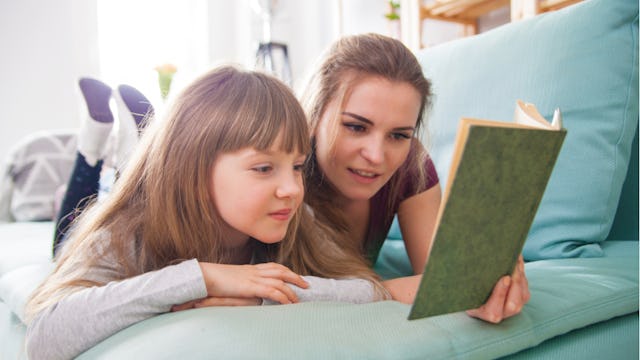This Is Why You Shouldn't Stop Reading Aloud To Your Big Kids

As exciting as it is to finally have an independent reader in the house, and as relieved as we are to never, ever again have to mumble through Goodnight Moon at the rate of five times per night, reading aloud to your children should be something that continues well beyond the preschool and early elementary years.
Research has long shown the benefits of reading aloud to babies, toddlers, and the preschool set, with reading aloud to children being considered “the single most important activity for building knowledge for their eventual success,” according to a report from children’s literacy organization Reading Is Fundamental (RIF).
And building strong foundations of literacy requires more than just exposing them to vocabulary via talking to them; it also specifically requires reading aloud. Research has shown that picture books are two to three times as likely as parent-child conversations to include a word that isn’t among the 5,000 most common English words, thus expanding our children’s vocabulary better than we can on our own. Additionally, listening to spoken word has been proven to assist children in developing and recognizing proper grammatical structure and increases word mastery.
But for some reason when our children actually know how to read and can comfortably read without our assistance, we tend to stop reading aloud to them. We wrongly assume that the benefits of reading aloud cease to exist once a child can read on their own, and that any form of “story time” is not something they would enjoy — or would even be beneficial. Research tells us otherwise, and the many benefits of reading aloud to small children can be reaped even when they are not so “small” anymore.
In other words, reading aloud to children should never have an end date.
Many of the same advantages we see young children gain when they are read aloud to do not disappear once the child becomes an independent reader. In fact, one of the benefits to reading aloud to older children is that it gives them the chance to read aloud back to you, providing hesitant readers the confidence they need for when they’re asked to read aloud in their classrooms.
But one of the most important things that reading aloud to older children can do is to further nurture and foster a lifelong love of reading, something that can be lost when children begin to look at reading as “schoolwork” and just something they have to do because they need a signature on their reading log.
Donalyn Miller, author of several books on engaging children with reading agrees, saying, “Reading aloud reminds children that reading is pleasurable, an activity they enjoyed before reading turned into a school chore.” As an adult (and librarian) who enjoys listening to audiobooks, I wholeheartedly agree because even adults can experience reading fatigue and forget the joy that reading brings — until we listen to someone read to us and we remember again why we love it so much. The same holds true for children, because as RIF notes, when we read to them, they “continue to associate reading with warm, pleasant feelings.”
Finally, reading aloud to older children can provide the perfect opportunity to explore more mature social and emotional issues by making it easier to start more difficult conversations. By reading aloud YA novels that tackle the hard-to-talk-about issues of adolescence and puberty, it gives us the chance to pause and engage our kids in discussions we may have shied away from or never felt comfortable initiating on our own. The conversation, and questions, will flow organically.
And the best part? You’ll find reading chapter books to your kids far more satisfying than saying “Goodnight” to a “moon and a little old lady.”